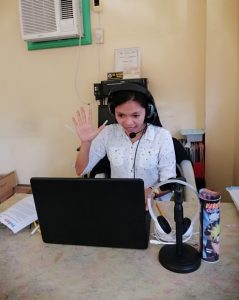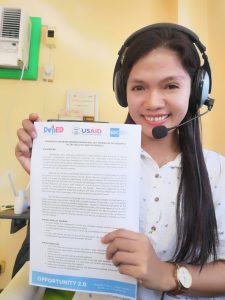It has been seven months since the teachers of the Philippine Alternative Learning System (ALS) were trained on delivering new Life Skills self-directed modules. New modules were fast-tracked and developed by the Department of Education through the USAID Opportunity 2.0 program to ensure out-of-school youth’s learning continue amid the COVID-19 crisis.
Rosemarie Rubia, ALS Coordinator from Zamboanga Peninsula Region of the Philippines, was one of the teachers first trained to deliver this new content and mode of teaching. She shares about how her students are faring with their new learning materials.
Before COVID-19, ALS teachers like Ma’am Rose would visit communities for class sessions. Ma’am Rose would borrow their family car during these visits as some of her students cannot afford to pay for a habal-habal ride to go to the community learning center (CLC). In the city’s south district, she recalled how they would cross rivers and walk a great distance to be able to reach the CLCs.
She fondly looked back to the many times they would ask her to translate some parts to the vernacular, so that they can proceed with the activities. Eventually, with Ma’am Rose’s guidance, the students were able to adapt to the new modules. Most of the students are tech-savvy, so it was not long before they discovered new resources to help them work on their coursework independently.

“Aw dali ra man diay ang Life Skills Modules Ma’am, basta basahon namo ug ayo dayon imoha itranslatesa Tagalog pud usahay,” they said. (The Life Skills Modules are easy [to comprehend] Ma’am as long as we read it well, and you translate to Tagalog from time to time.)
As much as some parents would like to help with the modules, they are unable to as their knowledge on the subjects and new tech is limited. Some students found this as an opportune time to share their learning with their family, as some activities do allow for family members’ participation.
Ma’am Rose is confident that the students can work on their activities efficiently despite these challenges.
“With the Self-Directed modules, mas madali ang pagtuturo sa kanila kahit pa minsan lang magkita, kasikayang intindihin ni learner ang module nang mag-isa.” (With the Self-Directed modules, teaching is easier even if we only meet [with the learner(s)] once a week, since they already have a module that they can easily understand.)
“The struggle is not on the delivery of the modules but on how to keep the fire burning for our OSY,” she added.
In 2020 alone, DepEd, through the USAID Opportunity 2.0 Program, more than 13,140 self-directed modules were produced and distributed in 12 cities in the Philippines, and 2000 ALS teachers were trained to deliver this new content to Filipino out-of-school youth.#


